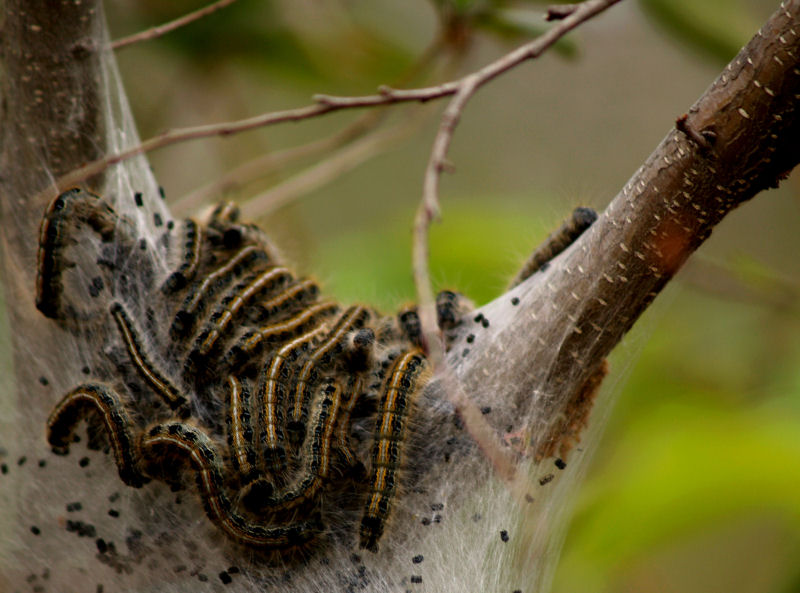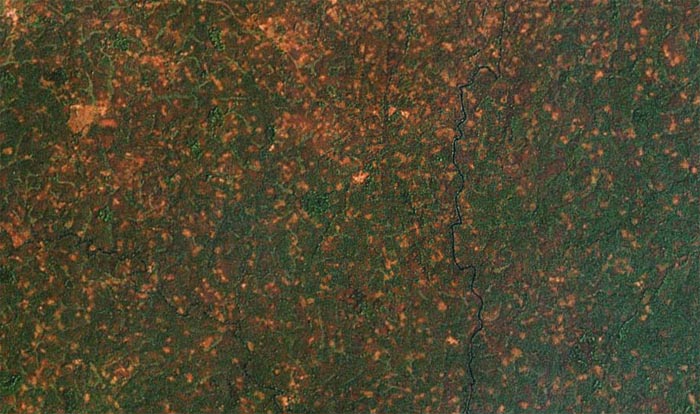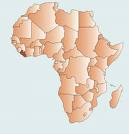|
by Michael Bradbury
Army Worms Invade & Devastate Liberia
Army worms have now struck 65 towns across Liberia, leaving in their wake wells contaminated by faeces, fields empty of crops and markets devoid of food.

According to a local farmer, Massaboi Kollie, who runs a 10-acre taro and pepper farm in the town of Belefanai, which was infested on 23 January: "Farmers are now scattered around the area and are no longer harvesting their crops so... there is a shortage of food in the markets... "Local vendor, Mamie Morris, reports:
"We are no longer making business. The worms have taken over all the towns where we normally buy bananas, plantains and peppers..."  Areas of brown, dead vegetation can be clearly seen from satellite images of the devastated areas. This leaves market vendors in Bong's capital Gbarnga with nothing to sell. Up to 20,000 people have fled their villages in Bong, Lofa and Gbarpolu counties, according to Liberia's Ministry of Agriculture. Anthony Menkor, 55, fled from Zota District with his 13-member family: "Life is becoming unbearable for us... We are relying on the limited crops that are left, and depending on other food being transported in from other regions." In Gbarnga the cost of some foods has more than doubled: a large bunch of bananas now cost US$10 up from $4; 1 kg taros that used to cost 38 cents now costs $2.25, according to fruit-seller Annie Sumo. As much as 75 percent of Zota District has been invaded by the worms, said the district's agricultural commissioner, Joseph Urey. "There is food shortage right now in my district and we are sending emergency calls for aid agencies to bring water and food to the affected people, who have been displaced from their towns."Officials with the ministries of agriculture, health and internal affairs and the Environmental Protection Agency have been spraying affected areas with insecticide, forcing most of the worms into the forest, according to Joseph Queliboh Subah, who manages the government effort to contain the insects. But this has sparked fear that the worms might cross the borders to Guinea and Sierra Leone. Subah said only aerial spraying can stem the spread, as insects climb trees to fertilise their eggs. According to Subah: "Liberia cannot contain the invasion so the international community has to come in to help with more advanced spraying. NGO's have not yet responded to appeals for assistance."Experts from the Food and Agriculture Organization (FAO) were expected to arrive in the capital Monrovia on 26 January to assess the extent of the damage and decide how to fight the worms, according to FAO's Liberia emergency coordinator Tim Vaesen.
UPDATE: January 30, 2009 A United Nations official has warned today that a UN-led team of experts is in a race against time in its attempt to halt a vast plague of caterpillars, known as armyworms, which has already swarmed across northern Liberia and threatens to march into neighbouring West African countries, destroying all crops and water supplies in its path. The enormous infestation of tens of millions of armyworms, one of the most destructive of insect pests, has forced the Liberian President, Ellen Johnson-Sirleaf, to call a national emergency in a country where access to food is already precarious. "The millions-strong caterpillar hordes devour all vegetation in their path and pollute wells and Each moth can fly up to 1,000 kilometers and lay 1,000 eggs,streams with their excrements wherever they go," said Representative of the UN Food and Agriculture Organization (FAO) in Liberia, Winfred Hammond. Some 100 villages in northern and central Liberia have now been affected and six communities in neighbouring Guinea to the north had also been struck, in some cases overrunning buildings and sending residents fleeing in panic. According to Liberian authorities, the emergency involves about 500,000 villagers. Mr. Hammond warned that much worse could be in store as many of the caterpillars had bored into the ground, out of reach of pesticides, and formed protective cocoons around themselves, waiting to re-emerge as moths in a week or so. "Each moth can fly up to 1,000 kilometers and lay 1,000 eggs," explained Mr. Hammond, who is an entomologist, stressing that "potentially, that's a recipe for disaster." Setting pheromone traps against male moths to avert the pending catastrophe is one of the possibilities the FAO team, comprising of experts from Ghana, Sierra Leone and Liberia, is considering. The traps would be baited with the scent females use to lure males into mating. Meanwhile, the Agriculture Ministry is using powerful pesticide sprayers to reach armyworms in the foliage of tall Dahoma trees, where they tend to congregate. "That's a very strange way for them to behave. Normally they like to stay much closer to the ground," said Mr. Hammond.
Comments: |

 Army worms are the larvae of moths [right]. The female mothd lay eggs on leaves and leaf sheaths near the ground. These eggs hatch within a few days and initially the larvae, armyworm, feed close to where they hatch. The larvae are found in cracks in the soil or under rocks during the day, feeding at night or early in the morning. In damp weather, they may feed all day. Larvae are generally omnivorous in attacking grasses. Species of these insects are found in most cereal-growing areas of the world. Armyworms sporadically cause severe damage; when they do, they can devastate large areas.
Army worms are the larvae of moths [right]. The female mothd lay eggs on leaves and leaf sheaths near the ground. These eggs hatch within a few days and initially the larvae, armyworm, feed close to where they hatch. The larvae are found in cracks in the soil or under rocks during the day, feeding at night or early in the morning. In damp weather, they may feed all day. Larvae are generally omnivorous in attacking grasses. Species of these insects are found in most cereal-growing areas of the world. Armyworms sporadically cause severe damage; when they do, they can devastate large areas. The worms, which invaded Bong country in central Liberia on 15 January, have spread to Gbarpolu County in the northwest and to Lofa County, which borders Guinea and Sierra Leone. Crops that remain in the affected Liberian towns -- including bananas, plantains, taros and peppers -- are not being harvested.
The worms, which invaded Bong country in central Liberia on 15 January, have spread to Gbarpolu County in the northwest and to Lofa County, which borders Guinea and Sierra Leone. Crops that remain in the affected Liberian towns -- including bananas, plantains, taros and peppers -- are not being harvested.